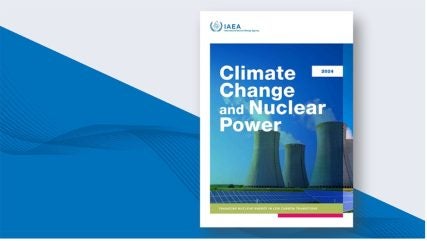
The 2024 edition of the International Atomic Energy Agency’s (IAEA’s) Climate Change and Nuclear Power report highlights the need for a significant increase in investment to achieve goals for expanding nuclear power. A rapid expansion of clean energy technologies is required to achieve net zero emissions by 2050 and nuclear power is expected to play a key role, with the IAEA projecting a capacity increase of 2.5 times the current level by mid-century in its high case scenario.
According to the report, to meet the IAEA’s high case projection for nuclear capacity in 2050, global investment in nuclear energy must increase to $125bn a year, up from the approximately $50bn a year invested from 2017 to 2023. The more aspirational goal of tripling capacity, which more than 20 countries pledged to work towards at COP28 last year, would require more than $150bn in annual investment.
“Across its near century-long lifetime, a nuclear power plant is affordable and cost competitive. Financing the upfront costs can be a challenge however, especially in market driven economies and developing countries,” said IAEA Director General Rafael Mariano Grossi. “The private sector will increasingly need to contribute to financing, but so too will other institutions. The IAEA is engaging multilateral development banks to highlight their potential role in making sure that developing countries have more and better financing options when it comes to investing in nuclear energy.”
The new report examines ways to unlock private sector finance. Last month, 14 major financial institutions including some of the world’s largest banks came together during a New York Climate Week event to signal a willingness to help finance nuclear newbuild projects.
Nuclear power’s inclusion in sustainable financing frameworks, including the European Union (EU) taxonomy for sustainable activities, is having a tangible impact. In the EU, the first green bonds have been issued for nuclear power in Finland and France in 2023. Electricité de France (EDF) was one of the first recipients, with the award of €4bn ($4.3bn) in green bonds and around €7bn in green loans between 2022 and 2024.
The report makes the case for policy reform and international partnerships to help bridge the financing gap and accelerate nuclear power expansion into emerging markets and developing economies, including for small modular reactors. Robust regulatory frameworks, new delivery models, skilled labour development and stakeholder engagement can unlock new avenues for sustainable energy investments towards development goals.






